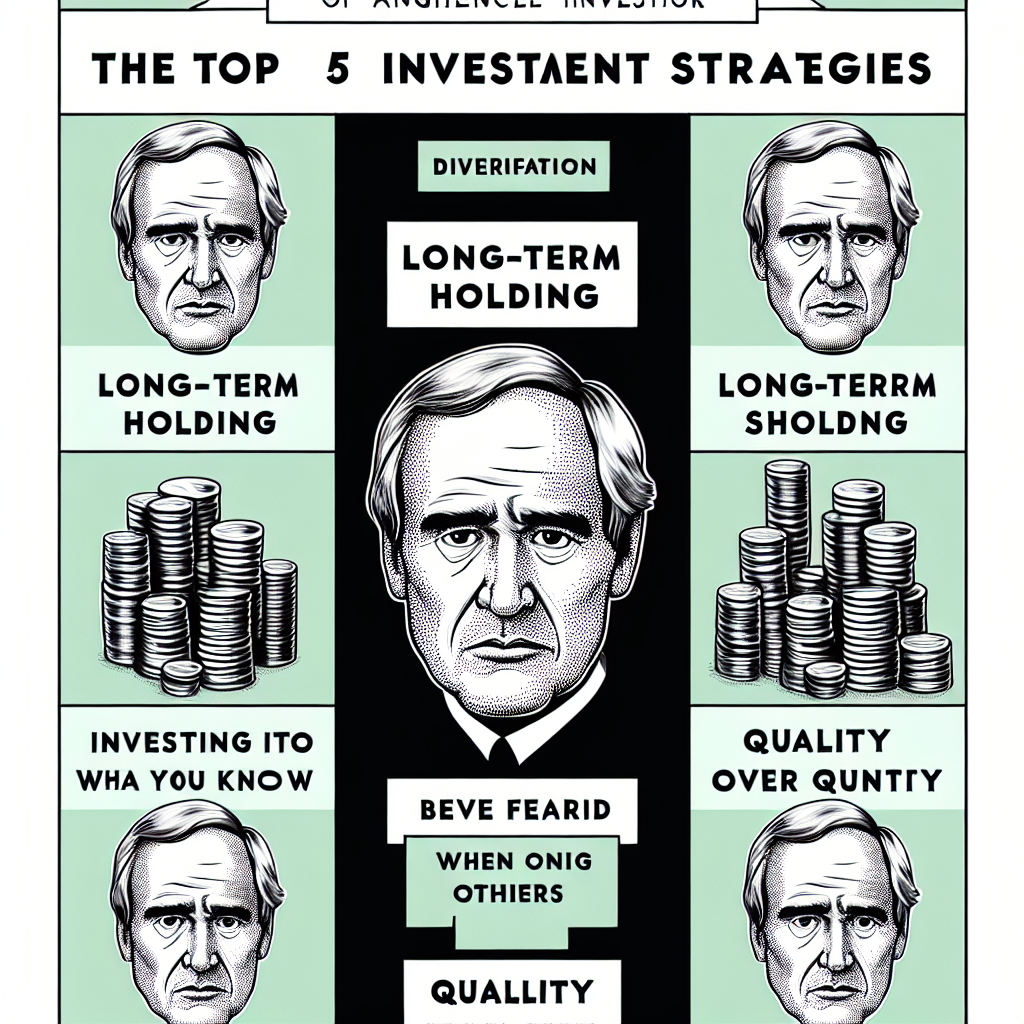
Value Investing: How Warren Buffett Finds Undervalued Stocks
Warren Buffett, also known as the Oracle of Omaha, is one of the most successful investors in the world. With a net worth of over $100 billion, he has proven time and time again that his investment strategies are effective and can lead to significant returns. So, what are his top 5 investment strategies? In this article, we will delve into the world of value investing and explore how Warren Buffett finds undervalued stocks.
Value investing is a strategy that involves buying stocks that are undervalued by the market. This means that the stock is trading at a lower price than its intrinsic value, making it a bargain for investors. Warren Buffett is a firm believer in this strategy and has used it to build his fortune over the years.
The first step in value investing is to identify undervalued stocks. This requires a thorough analysis of the company’s financials, including its balance sheet, income statement, and cash flow statement. Warren Buffett is known for his meticulous research and analysis of companies before investing in them. He looks for companies with strong fundamentals, such as a stable and growing revenue, low debt, and a competitive advantage in their industry.
One of the key metrics that Warren Buffett looks at is the price-to-earnings (P/E) ratio. This ratio compares the stock price to the company’s earnings per share (EPS). A low P/E ratio indicates that the stock is undervalued, while a high P/E ratio suggests that the stock is overvalued. Warren Buffett prefers to invest in companies with a low P/E ratio, as it indicates that the stock is trading at a discount.
Another important factor that Warren Buffett considers is the company’s management. He believes that a company’s success is heavily dependent on its management team. He looks for companies with a strong and trustworthy management team that has a proven track record of making sound business decisions. This is because a good management team can turn a struggling company around and increase its value, making it a good investment opportunity.
In addition to analyzing the company’s financials and management, Warren Buffett also looks at the company’s competitive advantage. He believes that a company with a strong competitive advantage is more likely to succeed in the long run. This could be in the form of a unique product or service, a strong brand, or a dominant market position. A company with a competitive advantage is more likely to generate consistent profits, making it a good investment for Warren Buffett.
Once Warren Buffett has identified an undervalued stock, he holds onto it for the long term. He is known for his buy-and-hold strategy, where he invests in companies that he believes will continue to grow and generate profits over time. This approach allows him to benefit from the power of compounding, where his investments grow exponentially over the years.
In conclusion, Warren Buffett’s top 5 investment strategies revolve around value investing. He carefully analyzes companies, looking for undervalued stocks with strong fundamentals, a trustworthy management team, and a competitive advantage. He then holds onto these stocks for the long term, allowing him to benefit from the power of compounding. By following these strategies, Warren Buffett has become one of the most successful investors of all time, and his methods can serve as a guide for aspiring investors looking to build their own wealth.
The Power of Patience: Why Warren Buffett Holds Stocks for the Long Term
Warren Buffett, also known as the Oracle of Omaha, is one of the most successful investors in the world. With a net worth of over $100 billion, he has proven time and time again that his investment strategies are effective and can withstand the test of time. One of his key strategies is his ability to hold onto stocks for the long term, a practice that has earned him billions of dollars. In this article, we will delve into the power of patience and why Warren Buffett believes in holding stocks for the long term.
One of the main reasons why Warren Buffett holds onto stocks for the long term is because he believes in the power of compounding. Compounding is the process of reinvesting your earnings to generate even more earnings. This means that the longer you hold onto a stock, the more time it has to grow and generate returns. Buffett once said, ”Our favorite holding period is forever.” This statement perfectly encapsulates his belief in the power of compounding and the importance of holding onto stocks for the long term.
Another reason why Buffett holds onto stocks for the long term is because he focuses on the fundamentals of a company rather than short-term market fluctuations. He looks for companies with strong financials, a competitive advantage, and a solid management team. Once he finds a company that meets his criteria, he holds onto it for the long haul, regardless of any short-term market volatility. This approach has proven to be successful for Buffett, as he has seen his investments grow significantly over time.
Moreover, Buffett’s long-term investment strategy is also rooted in his belief in the value of patience. He understands that the stock market is unpredictable and that it takes time for a company’s true value to be reflected in its stock price. This is why he is not swayed by short-term market movements and is willing to wait for the right opportunity to invest. As he famously said, ”The stock market is a device for transferring money from the impatient to the patient.” This statement highlights the importance of patience in the world of investing and how it can lead to significant returns in the long run.
In addition to the power of compounding, focusing on fundamentals, and having patience, Buffett also believes in the importance of staying disciplined. He does not let emotions or market trends dictate his investment decisions. Instead, he sticks to his investment principles and stays disciplined in his approach. This means that even during times of market downturns, Buffett remains calm and stays invested in his chosen companies. This discipline has paid off for him, as he has seen his investments weather through various market cycles and come out on top in the long run.
Lastly, Buffett’s long-term investment strategy is also influenced by his belief in the potential of the companies he invests in. He looks for companies that have a strong potential for growth and are undervalued by the market. By holding onto these companies for the long term, he is able to reap the benefits of their growth and see his investments multiply over time. This approach requires a great deal of patience and trust in the companies he invests in, but it has proven to be a winning strategy for Buffett.
In conclusion, Warren Buffett’s ability to hold onto stocks for the long term is a testament to the power of patience in the world of investing. By focusing on the fundamentals, having patience, staying disciplined, and believing in the potential of his investments, Buffett has been able to generate significant returns over the years. As investors, we can learn a lot from his approach and apply it to our own investment strategies. After all, as Buffett himself said, ”The stock market is a no-called-strike game. You don’t have to swing at everything – you can wait for your pitch.”
The Importance of Diversification: Lessons from Warren Buffett’s Portfolio
Warren Buffett, also known as the Oracle of Omaha, is one of the most successful investors in the world. With a net worth of over $100 billion, he has become a household name in the world of finance. Many people look to him for investment advice and try to emulate his strategies in hopes of achieving similar success. So, what are the top 5 investment strategies that have made Warren Buffett so successful? In this article, we will focus on one of the key strategies that has played a crucial role in his success – diversification.
Diversification is the practice of spreading your investments across different asset classes, industries, and geographical regions. It is a risk management technique that aims to reduce the impact of market volatility on your portfolio. Warren Buffett is a firm believer in the power of diversification and has often emphasized its importance in his investment philosophy.
One of the main reasons why diversification is crucial is that it helps to minimize the impact of market fluctuations on your portfolio. By investing in a variety of assets, you are not putting all your eggs in one basket. This means that if one asset class or industry is underperforming, the other investments in your portfolio can help to offset the losses. This is exactly what happened during the 2008 financial crisis when Buffett’s portfolio was able to weather the storm due to its diversified nature.
Another benefit of diversification is that it allows you to take advantage of different market cycles. Different asset classes perform differently at different times. For example, when the stock market is down, the real estate market may be booming. By diversifying your investments, you can take advantage of these market cycles and potentially earn higher returns.
Warren Buffett’s portfolio is a prime example of the power of diversification. His portfolio consists of a mix of stocks, bonds, real estate, and even private businesses. This diversification has helped him to achieve consistent returns over the years, even during times of economic downturns.
However, it is important to note that diversification does not mean investing in a large number of assets without any strategy. Buffett has often emphasized the importance of investing in what you know and understand. This means that you should only invest in assets that you have thoroughly researched and have a good understanding of their potential risks and returns.
Moreover, diversification does not guarantee profits or protect against losses. It is simply a risk management technique that can help to reduce the impact of market volatility on your portfolio. It is important to regularly review and rebalance your portfolio to ensure that it is aligned with your investment goals and risk tolerance.
In addition to diversifying across different asset classes, Warren Buffett also emphasizes the importance of diversifying within an asset class. For example, instead of investing in just one stock, he recommends investing in a basket of stocks from different industries. This further reduces the risk of your portfolio being heavily impacted by the performance of one particular stock.
In conclusion, diversification is a key strategy that has played a crucial role in Warren Buffett’s success as an investor. By spreading his investments across different asset classes and within each asset class, he has been able to minimize risk and take advantage of different market cycles. However, it is important to note that diversification should be done strategically and with a thorough understanding of the assets being invested in. So, if you want to follow in the footsteps of the Oracle of Omaha, make sure to diversify your investments and reap the benefits of a well-balanced portfolio.
Sticking to Your Principles: Warren Buffett’s Focus on Quality Companies
Warren Buffett, also known as the Oracle of Omaha, is one of the most successful investors in the world. With a net worth of over $100 billion, he has become a household name in the world of finance. But what sets him apart from other investors? What are his secrets to success? In this article, we will delve into Warren Buffett’s top 5 investment strategies, with a focus on his principle of investing in quality companies.
1. Do Your Research
Warren Buffett is known for his meticulous research and analysis before making any investment decisions. He believes in thoroughly understanding a company’s financials, management, and competitive advantage before investing in it. This principle of doing your homework is crucial in identifying quality companies that have the potential for long-term growth.
Buffett once said, ”Risk comes from not knowing what you’re doing.” This statement highlights the importance of research in investing. By understanding a company’s fundamentals, you can make informed decisions and avoid risky investments.
2. Invest in What You Understand
Another key principle of Warren Buffett’s investment strategy is to invest in what you understand. He advises against investing in businesses or industries that you have no knowledge or interest in. This approach allows him to focus on quality companies that he can analyze and understand thoroughly.
Buffett’s investment portfolio mainly consists of companies in the consumer goods, finance, and technology sectors. These are industries that he has a deep understanding of, which has contributed to his success as an investor.
3. Look for a Competitive Advantage
Warren Buffett is a firm believer in investing in companies with a competitive advantage. This means investing in businesses that have a unique product or service, a strong brand, or a dominant market position. These companies have a higher chance of maintaining their profitability and growth in the long run.
Buffett’s investment in Coca-Cola is a prime example of this strategy. The company has a strong brand and a dominant market share in the beverage industry, making it a safe and profitable investment for him.
4. Focus on Long-Term Growth
Unlike many investors who focus on short-term gains, Warren Buffett’s investment strategy is centered on long-term growth. He believes in holding onto quality companies for an extended period, allowing them to grow and generate significant returns over time.
Buffett’s famous quote, ”Our favorite holding period is forever,” reflects his approach to investing. He has held onto companies like Coca-Cola and American Express for decades, reaping the benefits of their long-term growth.
5. Buy at a Discount
Lastly, Warren Buffett’s investment strategy involves buying stocks at a discount. He looks for undervalued companies that have the potential for growth but are currently trading at a lower price than their intrinsic value. This approach allows him to buy quality companies at a bargain, increasing his chances of making a profit in the long run.
Buffett’s investment in Bank of America is a prime example of this strategy. In 2011, he invested $5 billion in the bank when it was struggling, and its stock price was at a discount. Today, that investment has grown to over $30 billion, showcasing the power of buying at a discount.
In conclusion, Warren Buffett’s focus on quality companies has been a key factor in his success as an investor. By doing thorough research, investing in what he understands, and looking for a competitive advantage, he has been able to identify and invest in companies with long-term growth potential. His approach of buying at a discount and holding onto investments for the long haul has also contributed to his impressive track record. Aspiring investors can learn a lot from Warren Buffett’s investment strategies and apply them to their own portfolios.
The Role of Research: How Warren Buffett Makes Informed Investment Decisions
Warren Buffett is widely known as one of the most successful investors in the world. With a net worth of over $100 billion, he has proven time and time again that his investment strategies are effective and profitable. But what sets him apart from other investors? How does he consistently make informed decisions that lead to such impressive returns? The answer lies in his approach to research.
Buffett is a firm believer in the power of research when it comes to making investment decisions. He once famously said, ”Risk comes from not knowing what you’re doing.” This statement perfectly encapsulates his belief that thorough research is crucial in minimizing risk and maximizing returns.
So, what exactly does Buffett’s research process entail? Let’s take a closer look at his top five investment strategies and how research plays a vital role in each one.
1. Understanding the Company
Before investing in a company, Buffett makes sure to thoroughly understand its business model, competitive advantage, and financials. He believes that a company with a strong and sustainable competitive advantage is more likely to generate consistent profits and provide a good return on investment.
To gain this understanding, Buffett spends a significant amount of time researching the company’s history, management team, and industry trends. He also looks at the company’s financial statements, paying close attention to its revenue, earnings, and debt levels. This in-depth research allows him to make informed decisions about the company’s potential for growth and profitability.
2. Investing in What You Know
Buffett famously advises investors to ”never invest in a business you cannot understand.” This principle is closely tied to his belief in the power of research. He believes that by investing in companies and industries that he knows and understands, he can make more informed decisions and avoid costly mistakes.
For example, Buffett has famously avoided investing in technology companies because he admits that he does not fully understand their business models. Instead, he focuses on industries that he is familiar with, such as consumer goods and insurance.
3. Long-Term Perspective
Buffett is known for his long-term investment approach, and this is another area where research plays a crucial role. He believes that a company’s long-term prospects are more important than its short-term performance. To determine a company’s long-term potential, Buffett looks at its competitive advantage, management team, and industry trends.
He also pays close attention to a company’s financials, looking for consistent earnings growth and a strong balance sheet. This long-term perspective allows him to make informed decisions about a company’s potential for sustained success.
4. Valuing a Company
Buffett is a value investor, which means he looks for companies that are undervalued by the market. To determine a company’s value, he uses a combination of quantitative and qualitative research.
On the quantitative side, he looks at a company’s price-to-earnings ratio, price-to-book ratio, and other financial metrics to determine if it is undervalued. On the qualitative side, he looks at the company’s competitive advantage, management team, and industry trends to determine if it has the potential for long-term success.
5. Staying Informed
Lastly, Buffett believes in the importance of staying informed about the market and the companies he invests in. He spends a significant amount of time reading financial reports, industry news, and company updates to stay up-to-date on any changes that may affect his investments.
He also surrounds himself with a team of experts who provide him with valuable insights and help him make informed decisions. This constant flow of information allows him to adjust his investment strategy as needed and stay ahead of market trends.
In conclusion, Warren Buffett’s success as an investor can be attributed in large part to his thorough and diligent research process. By understanding the companies he invests in, sticking to what he knows, taking a long-term perspective, valuing companies, and staying informed, he has been able to consistently make informed decisions that lead to impressive returns. As investors, we can all learn from Buffett’s approach to research and use it to improve our own investment strategies.
Vi har mång spännande event inom Entreprenörskap, Investering och Personlig Utveckling. Du kan se alla här:
www.swedishwealthinstitute.se/event




